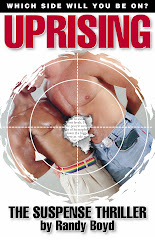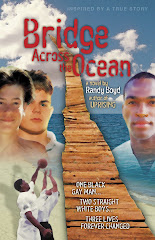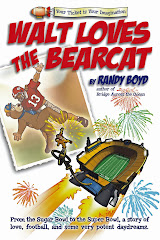 "Bucky the Bear and the Albuquerque Newsboy" originally appeared in the April 24, 1992, issue of Frontiers Magazine.
"Bucky the Bear and the Albuquerque Newsboy" originally appeared in the April 24, 1992, issue of Frontiers Magazine.“Oh, and I can't wait to see Basic Instinct,” my friend Jeff cooed excitedly over the phone.
Jeff is black and gay like me, though he is not politically conscious. He rarely thumbs through a gay publication, was barely aware of AB 101 and couldn't begin to tell you which politicians want to put us away. Yet every Oz needs its good-natured fairies who are adept at spreading good cheer, and he is a true friend.
This, however, was difficult. “You would see that?” I bristled.
“Don't tell me you're one of those,” he said, informing me that all the uproar concerning gays in the movies was the sole product of “a bunch of rich white gays who have nothing better to do with their time and who want every film to portray them as perfect, like in Longtime Companion,” while they don't care one bit about blacks, which is why they didn't complain about Paris Is Burning.”
“You could just go to a doctor or something and say: 'I wanna start liking girls.”
 to it, and if he read something besides the personals in Frontiers, he'd see that Hollywood's depiction of us as weirdos, killers and people to be made fun of only reinforces those beliefs.
to it, and if he read something besides the personals in Frontiers, he'd see that Hollywood's depiction of us as weirdos, killers and people to be made fun of only reinforces those beliefs.We got nowhere. Except on each other's nerves. Never mind that the ultimate message of Paris Is Burning is that these folks may be different, but they're striving for the same thing every soul wants, to be loved and accepted by someone.
Never mind that it's not so much whether a gay character is portrayed as
 queeny or a lesbian as butch---for these types do exist in real life--but Hollywood's glaring lack of gay characters, no matter how they act, whose lives, dreams, hopes and goals are real, valid and productive, just like Kevin Costner's or Bill Cosby's.
queeny or a lesbian as butch---for these types do exist in real life--but Hollywood's glaring lack of gay characters, no matter how they act, whose lives, dreams, hopes and goals are real, valid and productive, just like Kevin Costner's or Bill Cosby's.Never mind any of this to Jeff. Basic Instinct was the newest, latest, hottest, sexiest thriller, and he just had to see it.
The conversation left me empty and hopeless. If we can't even get our own people to see the light ...
A few days later I found myself in Albuquerque, New Mexico, for the annual college basketball tournament, jawing back and forth with three friends who were on hand to watch UCLA while I was there to root for my hometown Indiana Hoosiers.
The morning of the game, I stepped into the lobby of a roadside pancake house and was greeting“You see the movie JFK? I thought all gays were freaks like that."
 by a tall, thin Latino boy selling the Saturday paper. “You play for a team?” he asked eagerly, his dark eyes as big as two moons. (At six-foot-four with black skin, I can't walk a city block without someone asking me if I'm an athlete.)
by a tall, thin Latino boy selling the Saturday paper. “You play for a team?” he asked eagerly, his dark eyes as big as two moons. (At six-foot-four with black skin, I can't walk a city block without someone asking me if I'm an athlete.)In a disappointed voice, I said, “No, sorry, I'm just a fan,” and he laughed. I bought a paper and while I waited for a table, we talked about the game, his job, his goal to become a pop singer. His name was Tony and he was 15 (half my age). Inadvertently he taught me
 the latest teenage slang: “That's sick,” meaning “that's cool.” He was exuberant and talkative, volunteering his life story and asking mine in return.
the latest teenage slang: “That's sick,” meaning “that's cool.” He was exuberant and talkative, volunteering his life story and asking mine in return.When breakfast was over, I returned to Tony's post in a secluded corner of the lobby, desirous of another dose of his youthful energy. As we said goodbye, he mentioned that when he became famous, he'd invite me backstage after one of his concerts so we could hobnob with the likes of Madonna.
“Except I don't know about her,” he said pensively. “She's a lesbian and all.”
I prodded innocently, giving him my theory that she was open-minded, if anything, which
 prompted him to further explain: “That kind of stuff, like gays and stuff, is against everything I stand for.” (News to me that you could stand for anything at 15.)
prompted him to further explain: “That kind of stuff, like gays and stuff, is against everything I stand for.” (News to me that you could stand for anything at 15.)The lobby was sparsely filled; the only other human not just passing through was a bear. Or rather, a short person dressed in a bear outfit, the restaurant's idea of a promotion gimmick. Bucky was the name stitched across his chest, his big bear head 10 times larger than normal. And he couldn't have been more than five feet away when I informed my newsboy: “I'm gay.”
“What?” Tony uttered with staggering disbelief, and it took a minute or two to convince him I wasn't joking. “You're not gay,” he kept saying.
 “You couldn't be gay; you're not girlish. We've been talking all this time. You're cool. I didn't even know.”
“You couldn't be gay; you're not girlish. We've been talking all this time. You're cool. I didn't even know.”Which is precisely why I told him.
“Why don't you just get it fixed,” he asked like a concerned friend, “go to a therapist? Tell him you wanna change?”
“It's not a choice,” I said.
“Yes, it is,” he insisted. “You could just go to a doctor or something and say: 'I wanna start liking girls.”
His reaction must have drawn the attention of Bucky the Bear, for he came over and plopped his squat body next to mine. “You're really gay?” Tony asked. For a moment I hesitated, but I couldn't back down in front of the bear.
“You mean to tell me my best friend could be gay?” How would I get him to admit it to me?”
“Yes,” I said, suddenly thankful Bucky was there to witness my lawful interaction with this minor.
“But you don't look gay,” Tony declared.
I tried to explain that all gays didn't look and act any one way, just like all Latinos and blacks
 didn't look and act any one way. He agreed with me on the Latinos and blacks part, even said he hated it when people expected him to act like a cholo; but the gay end of the deal was impossible for him to swallow.
didn't look and act any one way. He agreed with me on the Latinos and blacks part, even said he hated it when people expected him to act like a cholo; but the gay end of the deal was impossible for him to swallow.“You see the movie JFK?” he asked. “I thought all gays were freaks like that. Man, they were doing all kinds of freaky stuff in that.”
Right then I knew I had to make a valiant effort to undo what Oliver Stone and Jim Garrison had done, and felt at that singular moment that if they had included one positively functioning gay character, or made some sort of creative disclaimer acknowledging that for every Kennedy-killing patsy, a hundred “good” gays existed, maybe I
 wouldn't be trying to convince this kid that I wasn't a freak by mere virtue of my sexual orientation.
wouldn't be trying to convince this kid that I wasn't a freak by mere virtue of my sexual orientation.I tried telling him gays were just like anybody else, that we were good guys and bad guys, that we were doctors, lawyers, teachers, friends, etc. “You make it sound like you're everywhere,” he said, eyeing me warily.
“That's 'cause we are,” I said.
“Not here in Albuquerque, huh-uh.”
It was about this time that Bucky the Bear gave up his silence. “Gays are everywhere,” he said to the boy. “And they're people just like you.” From underneath the costume
 came the voice of a 40ish white man with the calm resonance of a school teacher; like a well-rehearsed duo, we spouted off the virtues of not judging people by labels and stereotypes.
came the voice of a 40ish white man with the calm resonance of a school teacher; like a well-rehearsed duo, we spouted off the virtues of not judging people by labels and stereotypes.Tony debated us every step of the way, regurgitating his homophobia adamantly, proclaiming he'd disown a future child of his that ever “turned gay,” not caring if that child then turned to suicide. But in return, he listened to my side of the story with awe and curiosity, relentless in his adolescent pursuit of the truth.
“You mean to tell me my best friend could be gay?” he asked at one point. “How would I get him to admit it to me?”
“Do you suspect that he might be gay?” I asked.
“Kinda, sometimes,” he reflected. “Certain hints he'll drop, but I'm not sure. Could I just ask him?”
“I bet you go around joking about fags, don't you?” I asked; he fessed up to it with a sheepish laugh. “Well, even if your friend is gay, chances are he wouldn't tell you because he's afraid you wouldn't accept him.”
“I wouldn't,” he said flatly.
“Then you'll lose a friend.”
He shrugged as if to say, So be it; but in his worried face I saw him struggling with that one.
From an adult this kind of attitude would have ignited the angry cords of my soul. But in Tony's
 big brown eyes I saw a naïve boy grappling with territory he'd never dreamed of, territory that said gays were more than assassination-plotting freaks. He still couldn't get over the fact that he had talked to me for close to an hour and decided I was cool before finding out I was gay.
big brown eyes I saw a naïve boy grappling with territory he'd never dreamed of, territory that said gays were more than assassination-plotting freaks. He still couldn't get over the fact that he had talked to me for close to an hour and decided I was cool before finding out I was gay.“I can't believe I told you I'm against it and you still told me,” he said half a dozen times.
“That's because I'm comfortable with who I am and I've got nothing to hide,” I countered.
“That's sick,” he said, using his teenage slang.
“Good sick or bad sick?” I inquired. He shook his head, staring out the window.
“Just astonishing sick.”
For Tony, meeting a tall black dude who he thought played for one of the teams in town and
 finding out he's gay and not girlish and not a freak was like an earthquake.
finding out he's gay and not girlish and not a freak was like an earthquake.“This is really something else,” he said, dumbfounded. “I can't believe I”m going through this.”
He told me he had so many questions now and that maybe he would bring them up in Health and Safety on Monday so that all the kids in school could discuss it. (Yes, the young are that frank. Innocence still exists.) Yet I never got the feeling he was ready to change his homophobic ways, although it was evident that now, because of Bucky the Bear and me, he was going to think.
Before I left the pancake house Bucky wished me good luck. I patted him on his brown-carpeted arm and told him, “Keep educating thew world.” I never got a glimpse of his human face.
Tony was still processing as I parted, so much so that he barely said goodbye. But I walked away feeling that the religious experience called “March Madness” scheduled to take place at the
 basketball arena that afternoon was senseless in comparison to opening a child's mind concerning gays.
basketball arena that afternoon was senseless in comparison to opening a child's mind concerning gays.Yet I couldn't help wondering how much impact I'd had on Tony, and if anyone would hear his best friend's cry for help. And what about all the other young “future leaders of the world” who are more likely to be exposed to JFK and Basic Instinct before they get a chance to talk openly and honestly with a gay man or woman? Even if they do come face to face with someone gay, will they be as willing to listen and debate as Tony, or will the images of Hollywood scare them away?














